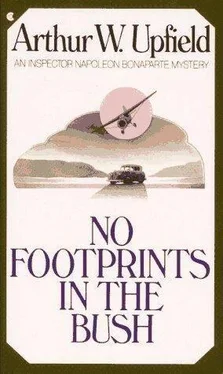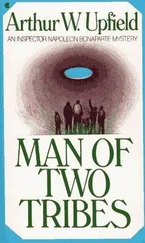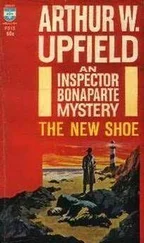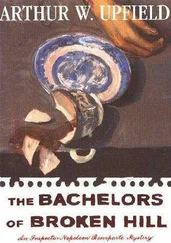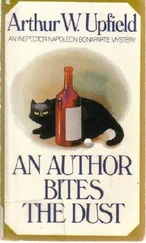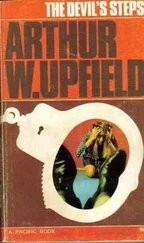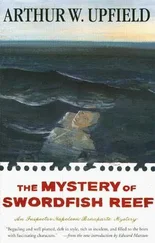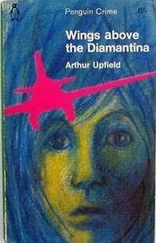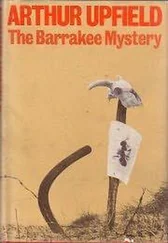Arthur Upfield - No footprints in the bush
Здесь есть возможность читать онлайн «Arthur Upfield - No footprints in the bush» весь текст электронной книги совершенно бесплатно (целиком полную версию без сокращений). В некоторых случаях можно слушать аудио, скачать через торрент в формате fb2 и присутствует краткое содержание. Жанр: Классический детектив, на английском языке. Описание произведения, (предисловие) а так же отзывы посетителей доступны на портале библиотеки ЛибКат.
- Название:No footprints in the bush
- Автор:
- Жанр:
- Год:неизвестен
- ISBN:нет данных
- Рейтинг книги:5 / 5. Голосов: 1
-
Избранное:Добавить в избранное
- Отзывы:
-
Ваша оценка:
- 100
- 1
- 2
- 3
- 4
- 5
No footprints in the bush: краткое содержание, описание и аннотация
Предлагаем к чтению аннотацию, описание, краткое содержание или предисловие (зависит от того, что написал сам автор книги «No footprints in the bush»). Если вы не нашли необходимую информацию о книге — напишите в комментариях, мы постараемся отыскать её.
No footprints in the bush — читать онлайн бесплатно полную книгу (весь текст) целиком
Ниже представлен текст книги, разбитый по страницам. Система сохранения места последней прочитанной страницы, позволяет с удобством читать онлайн бесплатно книгу «No footprints in the bush», без необходимости каждый раз заново искать на чём Вы остановились. Поставьте закладку, и сможете в любой момент перейти на страницу, на которой закончили чтение.
Интервал:
Закладка:
Jack Johnson, one-time sparring partner to the young McPherson: now the Wantella medicine man. Jack Johnson, the most horrific looking aborigine in the back country: yet famed for his patient good humour and skill in healing. His voice was gruff:
“Good day, boss!” he greeted the squatter.
“Good day, Jack. I want you and Iting to come with me to Watson’s Bore, but they say Iting is away after the cattle. You come all right?”
The deference to the aborigine’s wishes was significant. It indicated an understanding of aboriginal affairs which to the aborigines are of as great importance as affairs are to white people. That Jack Johnson wore only the pubic tassel announced his non-employment by the station, and, his freedom of action. Yet there was no hesitation in his voice-or in his mind. The McPherson wanted him. That was enough.
“Too right, boss! What we do, eh? Cattle ride?”
“No, Jack. I want you to come with Tich and me and the others. We’re going out into the Illprinka country.”
Now the black eyes gleamed and the lips parted to reveal grinning teeth.
“You go without me, boss, and I kick up a hell of a row,” the fellow said, clenching his enormous hands.
“I wouldn’t go without you, Jack Johnson,” McPherson said softly, affected by the man’s loyalty of which he had never felt doubt. “But not a word to any one, understand? Fetch a couple of saddles and bridles from the harness shed, and put them in the car.”
Again, quite willingly, he talked of birds and animals with the two little girls who clung to his rough hands. They passed into the house where he chatted to the lonely woman of things he thought would interest, but when she looked at him he sensed the uneasy fear in her mind concerning the renegade son.
The woman and her two children emerged with him from the house half an hour later and accompanied him to the car about which was gathered that portion of the Wantella tribe temporarily camped here. In the back seat of the car sat Jack Johnson, bolt upright, solemnly important, proud of the distinction.
There followed a scene illustrative of McPherson’s closeness to these allegedly primitive people. From the car he took a five-pound box of plug tobacco and presented each lubra and each buck with a gift. He knew them all, their names and their totem and their relationships; his knowledge of the last was extraordinary. He asked one old woman how her rheumatism was, and another how her burned leg was getting on; if this young man had taken that young woman to wife; and another when he was going to be sealed into the tribe. And the while he spoke to them the two white children clung to the hem of his old coat and the white woman chatted and laughed with her black sisters. When he drove away it was to the accompaniment of men’s shouts and women’s shrill cries of farewell.
It was half-past two o’clock when he reached Watson’s Bore.
Tich, obviously untroubled by the consumption of the cigar, welcomed them with broad smiles and the intelligence that the spare horses were yarded. The inevitable tea had to be sipped scalding hot and the five minutes spent in smoking and gossip. After that McPherson brought into the hut a part-bolt of unbleached calico and needles and thread, and started the two aborigines at the task of making small ration bags. On such an expedition as he was about to lead there would be no time for hunting food.
They were thus engaged when the absent stockmen returned, to pour like black water into the hut with the intelligence about the Illprinka smoke signals. The black water then had to pour out again, carrying McPherson with it, and, to obtain a better view, he and Jack Johnson climbed to the hut roof and sat astride the apex.
“Looks like they’re going to hold a corroboree away over at Duck Lake,” he shouted down to those on the ground. “Whatd’youthink?”
“Too right, boss,” they and Johnson agreed, the latter adding: “All them Illprinka men go away back from our boundary.”
The squatter reached the ground before he spoke again.
“It’ll give us a chance to move a long way into the Illprinka country in quick time,” he said. “It lets us in through an open gate. They’ll be at the corroboree for days, but we must give them a chance to get away back. I’ll go to the homestead for Burning Water and one or two more, and we’ll wait till near sundown before leaving.”
The squatter saw the significance of those signals but he failed to look into the mind directing them. He saw only the surface, the fact that the withdrawal of the Illprinka men to Duck Lake would mean the removal of the human screen protecting his son’s head-quarters. He was governed by the thought of exacting the McPherson justice, of dealing with an “annoyance” in the established McPherson manner.
An expeditionary force numbering no more than twenty would have distinct advantagesover a more numerous enemy. Such a force would be able to move more swiftly and secretly than a large body of men. The horses would have to be discarded to reduce the chances of discovery before the moment of attack. His force would be partly armed with rifles to blast a way to Rex, the fountain-head of dishonour and disaster out there in country inhabited only by wild aborigines, in country beyond the law’s normal reach and authority. If it could possibly be prevented there would be no outside publicity.
These thought occupied his mind whilst he drove his car along the road to the homestead, a mere track crossing undulating country belted with low scrub, paved with clay-pans, ridged by sand-dunes and graded by strips of plain.
The telephone posts carrying the single wire to the outermost post of white civilization came westward to flank the winding road when the road crossed a wide area of wind-scoured land dotted with fantastically shaped cores of sand still to be removed by the wind and the rain and the sun’s heat. The track wound in and out among these sand-cores, passing sometimes under the telephone wire, and presently McPherson saw ahead the wire lying across the road.
A break! It had not been broken when he passed a few hours before on the outward journey, but it is the last straw presented here by the alighting of a bird or the buffeting of awilli-willi that finally parts rusting wire.
He stopped the car to effect repairs, having the leg irons and body harness of the linesman on the car’s floor, and by chance he stopped the car beside a sand-core shaped not unlike a small cathedral. And he was standing on the running board with head and shoulders over the side whilst “fossicking” for the tools when he heard from behind him the voice which always had been clipped, concise and unemotional.
“Come backward with your hands empty, father.”
He knew the voice only too well, the flat tones beneath which lurked the cultural training, and even before he obeyed the command and stepped down to the ground the fire of anger burned into his neck and face. His actions, however, were deliberate, unhurried. The unknown depths of his son’s character he suspected.
And so he turned to look upon Tarlalin’s son, in his heart the desire that he would not witness the man’s smile. About Rex McPherson were five Illprinka men, desert blacks, three wearing not even the public tassel, their bodies caked with grime, their hair and beards rolled into tassels of filthy fat and grit. Rex was dressed in khaki drill shirt and trousers. He was shaved and clean and spruce, and despite his rage McPherson felt a degree of pride.
“Come forward, father, away from the car,” Rex ordered.
There was a vast difference between this half-caste and Napoleon Bonaparte. Bonaparte’s skin was a medium brown: this man’s skin was almost black, prevented from being black by a reddish tinge. He was six feet tall, fairly proportioned but not big. His features were devoid of the aborigine’s cast, strikingly handsome. His teeth were clean and perfect in formation. His eyes were small and black and steady in action.
Читать дальшеИнтервал:
Закладка:
Похожие книги на «No footprints in the bush»
Представляем Вашему вниманию похожие книги на «No footprints in the bush» списком для выбора. Мы отобрали схожую по названию и смыслу литературу в надежде предоставить читателям больше вариантов отыскать новые, интересные, ещё непрочитанные произведения.
Обсуждение, отзывы о книге «No footprints in the bush» и просто собственные мнения читателей. Оставьте ваши комментарии, напишите, что Вы думаете о произведении, его смысле или главных героях. Укажите что конкретно понравилось, а что нет, и почему Вы так считаете.
